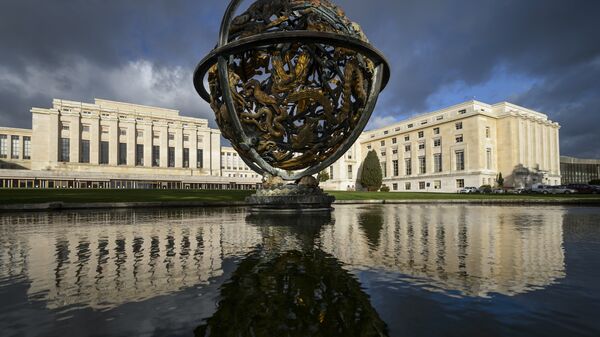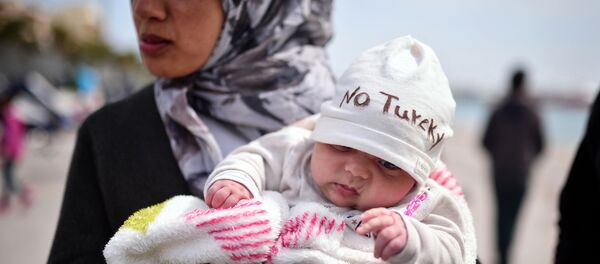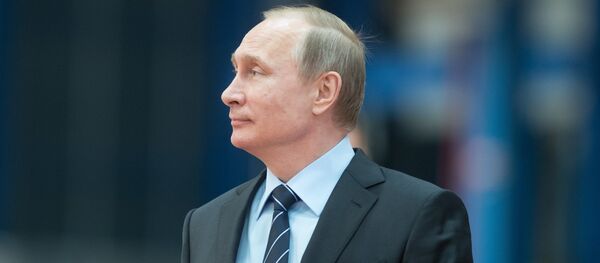MOSCOW (Sputnik), Alexander Mosesov — On Monday, the Syrian opposition’s High Negotiations Committee (HNC) put its participation in the intra-Syria talks on hold, citing the recent serious violations of the ceasefire and the deteriorating situation with humanitarian aid access in the country.
Earlier on Wednesday, a source close to the HNC told Sputnik that the delegation had split over the issue of the necessity to continue the current round of intra-Syrian talks. Part of the delegation insists on the "uselessness of talks" while fighting in Syria continues, for which they blame the Syrian government. The other side sees the talks as the only path toward settling the conflict.
At the same time, Bashar Jaafari, the head of the Syrian government's delegation in Geneva, said the governmental delegation still considers the talks as ongoing despite the move by the HNC.
Lack of Progress
"I guess the talks are in an impasse now… the two parties [to the conflict in Syria] are very far from each other, and a common point is almost impossible to reach now," Joseph Bahout, a visiting scholar with the Carnegie Center's Middle East Program, told Sputnik.
Renad Mansour, former adviser to the Iraqi Kurdistan’s regional government, noted that it will be hard to reach a consensus without each side "admitting that it needs each other."
"As such, the major proponents of finding agreement continue to be outside forces, namely the United States and Russia. Without this mutually hurting stalemate, it's hard to see meaningful negotiations by local actors," Mansour said.
According to Ross Harrison, Georgetown University professor and scholar at the Middle East Institute in Washington, DC, the talks in Geneva are not the main stumbling block.
"The cessation of hostilities, which was only partial to begin with, has essentially collapsed. Right now that collapse has occurred mostly in Aleppo but could spread to other areas. It will be unlikely that any progress can be made in Geneva while the situation on the ground looks so dire," Harrison said.
The latest round of intra-Syria talks began on April 13, and, according to the United Nations, was supposed to focus on Syria's political transition, governance, and new constitution. However, reports of outbreaks of hostilities caused the HNC to put its participation in the talks on hold.
Real Pressure
Bashar Jaafari, the head of the Syrian government's delegation, told Sputnik that Damascus expects Washington to exercise "real pressure" on the Syrian armed groups and opposition to make them engage in the settlement process more seriously and effectively.
Joseph Bahout said that both the United States and Russia "badly need them [the talks in Geneva] to go on, so there will be a lot of pressure, mainly from the US, on the opposition," in order to resume the process.
"This is unfortunate, and a bit short-sighted, since the result will be further disconnection between the political opposition and the forces on the ground," Bahout added.
Bahout also added that Russia should pressure the Syrian government as well, to discuss political transition and the role of President Bashar Assad into the future.
According to Ross Harrison, the United States does not control the opposition, "particularly Jabhat al-Nusra [al-Nusra Front], which, because of its affiliation with al-Qaeda, has been excluded from the cessation of hostilities ever since it went into effect in late February."
"Some of the mainstream opposition [like certain factions that fall under the umbrella of the Free Syrian Army] are backed by Saudi Arabia and Turkey," Harrison added.
Divided Opposition
"The real question is whether the HNC can impose results on the ground. They represent an impressive swath of what is very divided opposition forces," Ross Harrison said.
According to Renad Mansour, a unified delegation still seems "quite distant from reality as there are still several sides, each with its own mandate and ideology."
Summing up the whole issue, Joseph Bahout said there will be an increase in diplomatic posturing and "invention of new proposals, with no substance."
"The only question remains to know how long the truce can still hold," Bahout said.
Syria has been mired in civil war since March 2011, with government forces loyal to Assad fighting numerous opposition factions and extremist groups, such as Daesh and al-Nusra Front.
A US-Russia-brokered ceasefire came into force across Syria on February 27. It does not apply to terrorist groups such as Daesh and al-Nusra Front, both outlawed in several countries, including Russia.
According to the UN refugee agency, the violent armed conflict in Syria has killed more than 250,000 people and left 7.6 million Syrians internally displaced, while about 4.2 million have fled the country.



